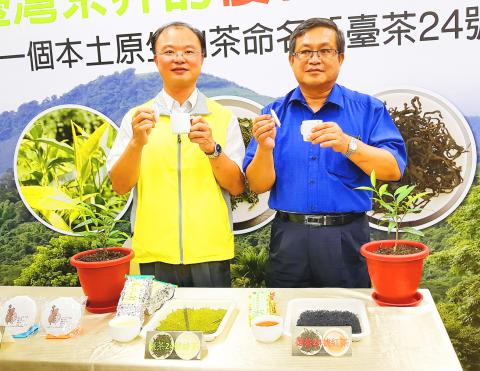The Council of Agriculture’s Tea Research and Extension Station (TRES) yesterday announced a new variety of tea called Taiwan Tea No. 24 that was developed from an indigenous tea plant dating to the Ice Age.
Known as the “Formosan landlocked salmon of Taiwanese tea,” Taiwan Tea No. 24 is the only purely indigenous variety of the Taiwan Tea series, station director Su Tsung-chen (蘇宗振) said.
Since 2000, the station’s Taitung branch has been conducting research on indigenous tea varieties on Taiping Mountain (太平山) in Taitung County’s Yanping Township (延平), he said.

Photo: Chien Hui-ju, Taipei Times
Using cutting propagation, researchers experimented with domestication, he said, adding that during the breeding period, they continued to explore the feasibility of growing tea plants native to mountainous regions on flat land.
The researchers searched for a native tea species on a mountain nearly 1,200m above sea level, said Yu Chin-an (余錦安), a research assistant at the station who worked on the project.
After 19 years, through various experimental procedures, single-seed selection and a series of comparative tests of superior strains, they have finally cultivated the plant, Yu said.
Taiwan Tea No. 24 is not only outwardly different from tea grown in the mountains in western parts of Taiwan, but also belongs to a different DNA group, the station said.
It is a variant of Camellia sinensis f. formosana and a plant left over from the Ice Age, it said.
It is highly resistant to disease and pests, and its advantages include having strong vigor and high yield, and tolerance to cold and drought, it added.
The aroma of the black tea it produces carries hints of mushroom, almonds and coffee, while the green tea has a citrusy flavor, the station said.
Analysis of its chemical composition showed that the caffeine content of Taiwan Tea No. 24 is far lower than that of Taiwan Tea No. 18 and other varieties, so drinking it would be unlikely to affect sleep quality, it said.
Its leaves contain high levels of free amino acids and relatively low levels of catechins, it said, adding that it can help “soothe the mind” and is less bitter.
The station is to apply for plant variety rights for the tea to initiate the process of technology transfer, it said.
Hualien and Taitung counties would be the first regions where the station promotes the variety, it said.

TRAFFIC SAFETY RULES: A positive result in a drug test would result in a two-year license suspension for the driver and vehicle, and a fine of up to NT$180,000 The Ministry of Transportation and Communications is to authorize police to conduct roadside saliva tests by the end of the year to deter people from driving while under the influence of narcotics, it said yesterday. The ministry last month unveiled a draft of amended regulations governing traffic safety rules and penalties, which included provisions empowering police to conduct mandatory saliva tests on drivers. While currently rules authorize police to use oral fluid testing kits for signs of drug use, they do not establish penalties for noncompliance or operating procedures for officers to follow, the ministry said. The proposed changes to the regulations require

The Executive Yuan yesterday announced that registration for a one-time universal NT$10,000 cash handout to help people in Taiwan survive US tariffs and inflation would start on Nov. 5, with payouts available as early as Nov. 12. Who is eligible for the handout? Registered Taiwanese nationals are eligible, including those born in Taiwan before April 30 next year with a birth certificate. Non-registered nationals with residence permits, foreign permanent residents and foreign spouses of Taiwanese citizens with residence permits also qualify for the handouts. For people who meet the eligibility requirements, but passed away between yesterday and April 30 next year, surviving family members

Taipei, New Taipei City, Keelung and Taoyuan would issue a decision at 8pm on whether to cancel work and school tomorrow due to forecasted heavy rain, Keelung Mayor Hsieh Kuo-liang (謝國樑) said today. Hsieh told reporters that absent some pressing reason, the four northern cities would announce the decision jointly at 8pm. Keelung is expected to receive between 300mm and 490mm of rain in the period from 2pm today through 2pm tomorrow, Central Weather Administration data showed. Keelung City Government regulations stipulate that school and work can be canceled if rain totals in mountainous or low-elevation areas are forecast to exceed 350mm in

China Airlines Ltd (CAL) yesterday morning joined SkyTeam’s Aviation Challenge for the fourth time, operating a demonstration flight for “net zero carbon emissions” from Taiwan Taoyuan International Airport to Bangkok. The flight used sustainable aviation fuel (SAF) at a ratio of up to 40 percent, the highest proportion CAL has achieved to date, the nation’s largest carrier said. Since April, SAF has become available to Taiwanese international carriers at Taipei International Airport (Songshan airport), Kaohsiung International Airport and Taoyuan airport. In previous challenges, CAL operated “net zero carbon emission flights” to Singapore and Japan. At a ceremony at Taoyuan airport, China Airlines chief sustainability